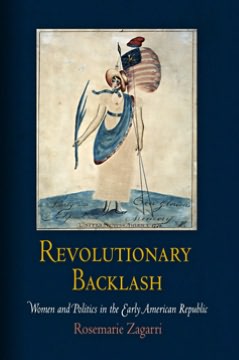 |
| Image courtesy of www.barnesandnoble.com |
Rosemarie Zagarri
2007
The Summary
Illustrating the lives and accomplishments of ladies throughout early American history, from the formation of the colonies to the presidency of Andrew Jackson, Revolutionary Backlash provides a study into the treatment and condition of women in early America.
The Good
Rosemarie Zagarri does some pretty thorough research in compiling her book. She sets the stage by providing ample historical references, lists of literary and social accomplishments by notable women, like Mercy Otis Warren and Judith Sargent Murray, and, in a word, she provides proof to support her claim that the American Revolution made a significant impact on the lives of women.
As a note, Zagarri separates her book into distinct chapters that highlight specific historical eras and further breaks down her chapters into manageable bite-size pieces. So, not only does her book provide ample information for the history enthusiast - or student, as the case may be - it allows for easy research.
The Bad
In her book, Zagarri provides an argument for the social and political growth of American women, during the American Revolution, and a subsequent social backlash. She provides a compelling argument; however, she often sequesters her research to a specific group of women: upper and middle-class white women.
To put it bluntly, Revolutionary Backlash doesn't offer much diversity in its study of early America.
The Ugly
Some books are riveting, and some books - well, not so much.
When it gets down to it, Revolutionary Backlash gets a little stale and a little boring. It's great for research, or if you happen to really enjoy early American history, but I would hesitate to recommend it for recreational reading.
I would caution any reader of this review to note that the reviewer does not understand the distinction between a "novel," which is a work of fiction, and a historical monograph, which is nonfiction. This leads one to question the accuracy of the whole review.
ReplyDeleteMy apologies. I do realize this is a work of non-fiction - and it's duly noted for my mistake of calling it a "novel" as opposed to distinguishing it as a work of historical non-fiction by Zagarri. At the same time, however, I write my own opinions on books I have read. It's not a question of accuracy, merely a question of whether you agree with one opinion or another. I never intended for my "reviews" to be professional, or used as a professional source - and I hope I haven't lead anyone to believe otherwise.
ReplyDeleteThank you for your feedback, and I'll be more careful in distinguishing between works of non-fiction and novels (works of fiction).